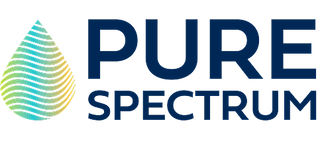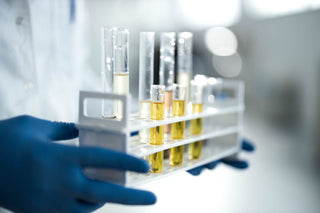As CBD oil becomes more popular, more and more different brands and types of CBD oil come onto the market. And while some, like ours, are high in quality, the same might not be true for every CBD oil out there.
So, knowing how to test CBD oil is crucial for beginners and long-time users alike. By doing your own research and testing, you can ensure that what you have is the real deal and that you're getting the full range of benefits out of your purchase.
And that's where we come in. As experts in the CBD industry, we'll teach you the ins and outs of testing your CBD oil in this CBD oil guide, so you can stay safe and happy on your CBD journey.
What this article covers:Why Test CBD Oil?
Not only is testing your CBD oil vital for making sure you get your money's worth, but it also protects your well-being.
The truth about CBD oil is that CBD oil that hasn't been tested or is low-quality could be detrimental to your health. For example, it might have herbicides, heavy metals, or solvents left over from the extraction process. It goes without saying that these aren't things you should be ingesting. Untested CBD oil might also not have as much CBD as it says it does, or it might contain too much CBD.
Because of this, it's important to buy CBD oil from a reliable company like Pure Spectrum CBD. Reliable businesses are always open about how they make their products and show the results of tests done by a third-party lab on them. These tests check the purity, potency, and quality of CBD oil to make sure it doesn't have any dangerous additives and that the label is correct.
At Pure Spectrum CBD, we're committed to the best quality, from the way we source our hemp to how we create our products. With us, you can rest assured you're getting what you pay for and are only receiving the best quality products - such as our 500mg CBD oil.
How to Test CBD Oil: A Step-by-Step Guide
We advise only purchasing CBD products that have undergone testing by a third party lab. This is the only way to ensure you are taking a safe product. However, there are a few things you can do at home to help verify the legitimacy of a product.
Pre-Testing Research
Before you even buy a bottle of CBD oil, you need to do some important research. For example, where does CBD oil come from? How was the hemp grown? What is the bioavailability of CBD oil? These questions will help you judge the quality of it. Most high-quality CBD oils are made from hemp that was grown without pesticides or other dangerous chemicals.
Find the test reports next. Trustworthy companies like Pure Spectrum CBD put the results of third-party lab tests on their websites or send them to customers who ask for them. These reports give a full study of the CBD oil, including its cannabinoid profile, the amount of THC (if any), and the presence or absence of contaminants.
Understanding Lab Reports
When you know how to read third-party lab reports, it's much easier to find your way around the world of CBD oil. These reports, which are also called Certificates of Analysis (CoAs), give a thorough look at what's in your CBD oil and are essential for making sure it's safe and of good quality.
What Is Third-Party Lab Testing?
For third-party testing, a CBD brand sends a sample of its product to an independent lab. Then, this lab runs different tests to find out how many cannabinoids are in the product, if there are any dangerous contaminants, and if the product meets legal standards.
The results of these tests are put together in a lab report, which the CBD business should make easy to find. Brands with a good reputation, like Pure Spectrum CBD, are proud of how open they are, so they make these reports public.

How to Read and Interpret Lab Reports
It might seem difficult to read and understand a lab report, but it's actually pretty easy once you know what to look for when buying CBD oil. And understanding them is the best method of CBD potency testing and THC testing. As experts, there are the most important things you should pay attention to:
- Cannabinoid Profile: This part of the study talks about how much CBD, THC, and other cannabinoids are in the product. This information is important to make sure that the amount of CBD mentioned on the product label matches what's in the report and that the amount of THC is 0.3% or less, which is the legal limit in the U.S. The type of product you're purchasing, such as full-spectrum or broad-spectrum, will affect these results.
- Contaminant Testing: This part tells you if the lab found any harmful substances, like heavy metals, pesticides, or leftover solvents. The product should pass all of these tests, which will show you that none of these substances are present in dangerous amounts. Contaminant testing for our products is available upon request
- Test Date: This tells you when the product was tested. Recent test dates are better because they show that their newer batches still pass quality checks.
- Lab Accreditation: Make sure the report comes from a lab that the International Organization for Standardization (ISO) has approved. This accreditation makes sure that the testing methods at the lab meet certain standards.
To become an intelligent CBD user, it's important to have an idea of how to read these lab reports. Doing so helps you understand how to choose CBD oil that is safe and effective.
Conclusion
Knowing how to test CBD oil is crucial for getting the full range of health benefits from it. By making sure you've purchased high-quality CBD oil, you can rest easy knowing that what you're consuming is safe and effective. As we've said over and over again in this guide, the quality and effectiveness of the CBD oil you use are vital and shouldn't be messed with.
At Pure Spectrum CBD, we pride ourselves on our transparency and making sure our customers receive the highest quality goods possible. With our specific extraction and creation process and our third-party lab test results, you can know from the get-go that you're getting an effective product.
Did our blog meet your needs? You might also find our other guides helpful:
- Does CBD Oil Have THC in It?
- CBD And THC Oil
- Does CBD Oil Work Without THC?
- Can You Put CBD Oil in Tea?
- Can You Cook with CBD Oil?
- Can You Put CBD Oil in a Drink?
- CBD Oil Recipes
- Can You Mix CBD Oil with Juice?
- CBD Oil for Anxiety
- Pros and Cons of CBD Oil for Anxiety
- Hemp oil vs. CBD oil for Anxiety
- CBD Oil for Anxiety and OCD
- CBD Oil vs. Gummies for Anxiety
- How Long Does CBD Oil Last?
- CBD Oil Strength


